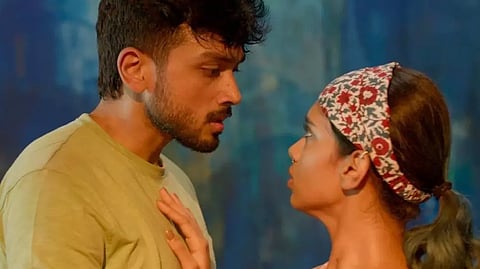

Director: Pa Ranjith
Cast: Dushara Vijayan, Kalidas Jayaram, Kalaiyarasan, Hari Krishnan Anbudurai, Shabeer Kallarakkal
Music: Tenma
Cinematographer: A Kishor Kumar
Editor: Selva RK
Synopsis: A theatre group involving a inclusive bunch of characters decides to stage a new play on contemporary love and perspectives based around it.
How are people attracted to each other and fall in love? Is it through sweet conversations or through what they like? Is desire the ultimate form of love or is there something called 'Punithamana Kadhal' (deified love)? These and many other themes is what director Pa Ranjith’s Natchathiram Nagargirathu explores.
The film opens up with a couple -- Dushara Vijayan (Rene) and Kalidas Jayaram (Iniyan) in bed, where Dushara questions does the value of love hinge on 'Thali Kayiru'? Rene keeps on chattering about marriages and when she sings Ilaiyaraaja songs, Iniyan gets annoyed. After a point, Iniyan slams at Rene saying that her appreciation for Ilaiyaraaja is motivated by her caste bias leading them into breaking up.
Later, all the inclusive theatre artists meet with Kalaiyarasan (Arjun) being the new one to the multicultural troupe in Pondicherry to discuss what their next play is going to be on. Each share their own interpretations of love and desire where Ranjith, the writer comes in. Arjun coming from a dominant land-holding caste spells out the term 'Naadaga Kaathal' or 'love sham', Ranjith flips the term and makes Regin Rose, who plays troupe's director (Subeer) deciding to do their next play on progressive nature of contemporary love.
The long-drawn out conversations might be drag for some, but this is a very crucial aspect as it lets us to process of how each of the characters has their own personal politics and ideologies. It is as evidently seen on how Rene lets Arjun stay in the troupe and face his mistakes to grow himself better, to be more politically right.
Ranjith is in a perfect form in this film and gets the film's focus apt as for a brief first half, the constant tension is being built up between Rene and Iniyan's love track with flashblacks interspersed so effectively that we feel like glazing through a memory-lane without much details on time and place. You clearly know them and root for them to understand each other and that goes same for Sumeeth Borana (Dayana) and Arjun (Praveen) or for Damu (Joyal) and Sherin (Sylvia).
There are so many intriguing dramatic portions brought out on screen, but due to focus shifting on all characters in the film, it feels like they all are not explored in much detail. They become more like supporting characters. For example, we know Dayana and Praveen love each other and fight, but details are scanty on their patch-up. Will they ever confess their love to the parents or are they are living together -- we have no clue. Having LGBTQIA+ characters on screen and showing no intimate scenes between them really feels like playing safe even through the film is censored certificate as 'A'.
But, the most jarring aspect is the final act, where 'Sarpatta Parambarai' fame Shabeer Kallarakkal, who dons the role of Sagas Ratchagan is just plain evil and is the typical Tamil Cinema villain. His ideology is interesting to know and is a clever screenwriting rule broken, but the ambiguity is very off putting comparing with the characters we have been following throughout. He is clearly the symbol of oppression and alluded a character from Ramayana, but it somehow pulls us out of the film and puts us into a box of questions for which answers are blank.
Nonetheless, the actors give their best for the role given, especially Kalaiyarasan, Dushara Vijayan and Kalidas Jayaram own their roles. Kalai plays the toxic cis-het male who is misogynist, casteist, homophobic and transphobic and his ideas about love are so filmy, his arch is so well portrayed on screen by the actor that when he shifts, we feel the changeover. Dushara also as this young, vulnerable, independent, bold, self-professed Ambedkarite sells it to perfection and Kalidas as this male egoistic person who is unable to pass over breakup also works. It's the testament to the actor's who can portray characters with the right kind of emotions.
Pa Ranjith goes all out in this film, he changes his filmmaking style as he strips off time jump details to mention where and what time it is happening unless it is necessary for the scene and presents us with only raw moments. He apart from exploring caste, class, gender, sexuality and honour killing never presents the film in the conventional methods of storytelling. He experiments with all the technical departments from Tenma's scintillating background score and songs that fits perfectly for the mood of the film -- from Rangaratinam’, 'Paruvame', 'Perinba Kadhal' to 'Kadhalar' all are brought into the screenplay seamlessly, especially 'En Janame' defines the horrors of honour killing in a single song. Kishore Kumar's cinematography also helps the film which shifts according to scenes -- sometimes indie, sometimes vibrant and colourful -- reminding of shows like 'Euphoria' and 'Elite'.
Overall, 'Natchathiram Nagargiradhu' is a progressive film and a striking experiment in Tamil Cinema that defies tropes on love, sexuality and gender bias and shows us reflection of how caste and class still exist in our society and how people with the perceptions can be molded and changed.
Visit news.dtnext.in to explore our interactive epaper!
Download the DT Next app for more exciting features!
Click here for iOS
Click here for Android